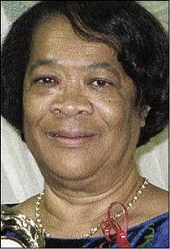
Contributed
Cherrell Shelley-Robinson
'A we dis? Cultural Representation of the Caribbean in Children's Books' is the title of a public lecture to be delivered by Dr Cherrell Shelley-Robinson, lecturer in the Department of Library and Information Studies at the University of the West Indies, Mona, on Thursday, September 10, beginning at 5.30 p.m. The lecture will be held in the Neville Hall Lecture Theatre.
Dr Shelley-Robinson will share some of the major findings from her research into the history and continuing emergence of a body of literature for Caribbean children, the characteristics of the literature and some of the challenges involved in its production, distribution and use.
The main focus of the lecture will be on issues relating to Caribbean cultural identity and authenticity, as found in information books published to meet the demands of the multicultural curriculum in Britain and North America. The presentation will conclude with some guidelines and recommendations for the creation of more authentic indigenous literature for children.
How often do you 'cuss off' someone? Why does it happen so often? Is it true that men don't quarrel? What about 'bad words'? Do women use them as often as men? Do they use the same ones? Do educated people 'trace off' each other? What example do our politicians set? Why do we 'dis' each other so much?
Head of the Department of Language, Linguistics and Philosophy, Dr Kathryn Shields Brodber, is conducting ethnographic research in discourse practices in Jamaica. She has studied the rise of Creole on radio, and is also investigating linguistic elements of courtroom interaction in Jamaica.
As part of her research, Dr Shields Brodber made tape recordings of arguments from radio talk shows, family members quarrelling with each other in public places, students and workers on the Mona campus and politicians campaigning in the 2007 general election in Jamaica. She wanted to put on paper some of the ways in which Jamaicans in different situations start, fuel and end disagreements.
Many family disputes occur in the open, on a sidewalk, at a standpipe, at a shop, in a taxi. This means that a ready-made audience can take part, by taking sides or by being a setter-on to fan the flames. The same audience can also help to bring an end to the argument.
Domestic favours
'Tracing' takes different forms. A female spouse often responds to infidelity by withdrawing speech, domestic favours and sex. She may argue that her spouse should harass his 'matey' for them. If he cannot provide money for her and her children, she may embarrass him by questioning his manhood.
A male spouse who is cheating may accuse his partner of not fulfilling his needs. But he may have no other excuse than that 'a so man stay' and she will just have to live with it.
Fathers often have no patience with their sons' mistakes so they call them 'idiat'. If the young boy cries in response, his father may ask "Yu a gal?" Parents often 'put down' each other in front of their children and refer to each other with disrespect.
'Putting down' also occurs outside the family unit. A 14-year-old girl, who was arrested for using a 'bad word' to police, phoned a talk show to give her side of the story. She claimed that she had used the word to the police because they had made extremely disrespectful comments about her and her mother. She had responded to disrespect from those in authority.
Unkind remarks
Politicians in Jamaica also set a bad example. They call each other names, make unkind remarks about each other and are sometimes openly abusive. Recordings from speeches in campaign meetings make it clear that 'tracing' is accepted among political rivals.
Talk shows which take place throughout the day and night offer many examples. Callers will 'trace' a host who disagrees with them or seems to be belittling them. The host may 'trace' back, or at least put callers in their place. If callers keep talking and not listening, a host may go silent, chastise them or cut them off. Others will call in to fuel the argument or chastise the host.
On many occasions, 'tracing' is a means of ending disputes, with members of the audience, invited and uninvited, helping to resolve it. Unfortunately, however, arguments may get out of hand and end in physical violence.
The challenge for researchers is to find out how children respond to 'tracing' and help them to benefit from it by using it to resolve rather than fuel conflict. Phase Two of this research will address these issues.